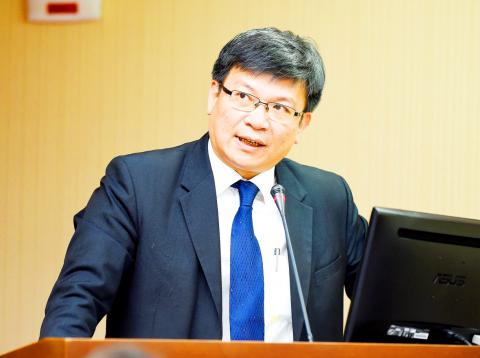Democratic Progressive Party (DPP) lawmakers yesterday asked government officials to better explain the administration’s air pollution control and energy policies to the public, after a referendum requiring the government to reduce thermal power generation was passed by voters last month.
Referendum #7, which was held alongside the Nov. 24 nine-in-one elections, asked voters: “Do you agree that the share of thermal power in the annual energy structure should be reduced by at least 1 percent per year on average?”
The referendum result was discussed at a meeting of the legislature’s Social Welfare and Environmental Hygiene Committee, where Chinese Nationalist Party (KMT) lawmakers asked government officials to explain how they planned to achieve the goal.

Photo: Huang Yao-cheng, Taipei Times
The Ministry of Economic Affairs needs to consult relevant agencies and would next month present draft guidelines on how to achieve the goal, Deputy Minister of Economic Affairs Tseng Wen-sheng (曾文生) said.
The ministry is evaluating to what degree such a reduction would improve the nation’s air quality, given that PM2.5 — fine particulate matter measuring 2.5 micrometers or smaller — emitted by thermal power plants account for only 4.5 to 9.9 percent of domestically produced PM2.5 pollution, Tseng said, citing Environmental Protection Agency data released at the end of last year.
DPP Legislator Chung Chia-pin (鍾佳濱) said the referendum question was misleading, because what people really want is to cut the amount of air pollutants emitted by power plants.
The EPA should explain to the public the difference between the three, he said, adding that the referendum results have helped the DPP understand the importance of properly explaining its policies.
The ministry should also better explain its renewable power policy, as some people are questioning whether the nation’s renewable power prices are more expensive than other countries, DPP Legislator Lin Ching-yi (林靜儀) said.
People are exploiting public concerns over the government’s alleged waste of funds to spread misinformation, so officials must explain their policies more clearly to make sure that everyone can easily understand them, Lin added.
The nation’s air quality has been improving, EPA Acting Minister Tsai Hung-teh (蔡鴻德) said, adding that the annual average PM2.5 concentration has fallen from 18.3 micrograms per cubic meter last year to 17.4 micrograms per cubic meter as of last month.
Asked by lawmakers if the agency might collect a carbon tax, Tsai said it is one of the options to curb carbon emissions, but added that government agencies have yet to reach a consensus on the matter.

Alain Robert, known as the "French Spider-Man," praised Alex Honnold as exceptionally well-prepared after the US climber completed a free solo ascent of Taipei 101 yesterday. Robert said Honnold's ascent of the 508m-tall skyscraper in just more than one-and-a-half hours without using safety ropes or equipment was a remarkable achievement. "This is my life," he said in an interview conducted in French, adding that he liked the feeling of being "on the edge of danger." The 63-year-old Frenchman climbed Taipei 101 using ropes in December 2004, taking about four hours to reach the top. On a one-to-10 scale of difficulty, Robert said Taipei 101

Nipah virus infection is to be officially listed as a category 5 notifiable infectious disease in Taiwan in March, while clinical treatment guidelines are being formulated, the Centers for Disease Control (CDC) said yesterday. With Nipah infections being reported in other countries and considering its relatively high fatality rate, the centers on Jan. 16 announced that it would be listed as a notifiable infectious disease to bolster the nation’s systematic early warning system and increase public awareness, the CDC said. Bangladesh reported four fatal cases last year in separate districts, with three linked to raw date palm sap consumption, CDC Epidemic Intelligence

Taiwanese and US defense groups are collaborating to introduce deployable, semi-autonomous manufacturing systems for drones and components in a boost to the nation’s supply chain resilience. Taiwan’s G-Tech Optroelectronics Corp subsidiary GTOC and the US’ Aerkomm Inc on Friday announced an agreement with fellow US-based Firestorm Lab to adopt the latter’s xCell, a technology featuring 3D printers fitted in 6.1m container units. The systems enable aerial platforms and parts to be produced in high volumes from dispersed nodes capable of rapid redeployment, to minimize the risk of enemy strikes and to meet field requirements, they said. Firestorm chief technology officer Ian Muceus said

MORE FALL: An investigation into one of Xi’s key cronies, part of a broader ‘anti-corruption’ drive, indicates that he might have a deep distrust in the military, an expert said China’s latest military purge underscores systemic risks in its shift from collective leadership to sole rule under Chinese President Xi Jinping (習近平), and could disrupt its chain of command and military capabilities, a national security official said yesterday. If decisionmaking within the Chinese Communist Party has become “irrational” under one-man rule, the Taiwan Strait and the regional situation must be approached with extreme caution, given unforeseen risks, they added. The anonymous official made the remarks as China’s Central Military Commission Vice Chairman Zhang Youxia (張又俠) and Joint Staff Department Chief of Staff Liu Zhenli (劉振立) were reportedly being investigated for suspected “serious